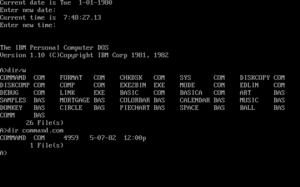PC DOS 1.0
 |
|

A typical command line in PC DOS
|
|
| Developer | IBM and Microsoft |
|---|---|
| Written in | Assembly language, C |
| OS family | DOS |
| Working state | No longer supported |
| Source model | Closed source |
| Initial release | August 1981 |
| Latest release | PC DOS 2000 / April 1998 |
| Latest preview | PC DOS 7.1 / 2003 |
| Platforms | x86 |
| Kernel type | Monolithic kernel |
| Default user interface | Command line interface |
| License | Commercial proprietary software |
| Official website | www-06 |
IBM PC DOS (an acronym for IBM personal computer disk operating system) is a discontinued operating system for the IBM Personal Computer, manufactured and sold by IBM from the 1981 into the 2000s. Before version 6.1, PC DOS was an IBM-branded version of MS-DOS. From version 6.1 on, PC DOS became IBM's independent product.
The IBM task force assembled to develop the PC decided that critical components of the machine, including the operating system, would come from outside vendors. This radical break from company tradition of in-house development was one of the key decisions that made the IBM PC an industry standard. At that time private company Microsoft, founded five years before by Bill Gates, was eventually selected for the operating system.
IBM wanted Microsoft to retain ownership of whatever software it developed, and wanted nothing to do with helping Microsoft, other than making suggestions from afar. According to task force member Jack Sams,
The reasons were internal. We had a terrible problem being sued by people claiming we had stolen their stuff. It could be horribly expensive for us to have our programmers look at code that belonged to someone else because they would then come back and say we stole it and made all this money. We had lost a series of suits on this, and so we didn't want to have a product which was clearly someone else's product worked on by IBM people. We went to Microsoft on the proposition that we wanted this to be their product.
IBM first contacted Microsoft to look the company over in July 1980. Negotiations continued over the next months, and the paperwork was officially signed in early November.
Although IBM expected that most customers would use PC DOS, The IBM PC also supported CP/M-86, which became available six months after PC DOS,and UCSD p-System operating systems. IBM's expectation proved correct: one survey found that 96.3% of PCs were ordered with the $40 PC-DOS compared to 3.4% for the $240 CP/M-86.
Microsoft first licensed, then purchased86-DOS from Seattle Computer Products (SCP), which was modified for the IBM PC by Microsoft employee Bob O'Rear with assistance from SCP (later Microsoft) employee Tim Paterson. O'Rear got 86-DOS to run on the prototype PC in February 1981. 86-DOS had to be converted from 8-inch to 5.25-inch floppy disks and integrated with the BIOS, which Microsoft was helping IBM to write. IBM had more people writing requirements for the computer than Microsoft had writing code. O'Rear often felt overwhelmed by the number of people he had to deal with at the ESD (Entry Systems Division) facility in Boca Raton.
...
Wikipedia
